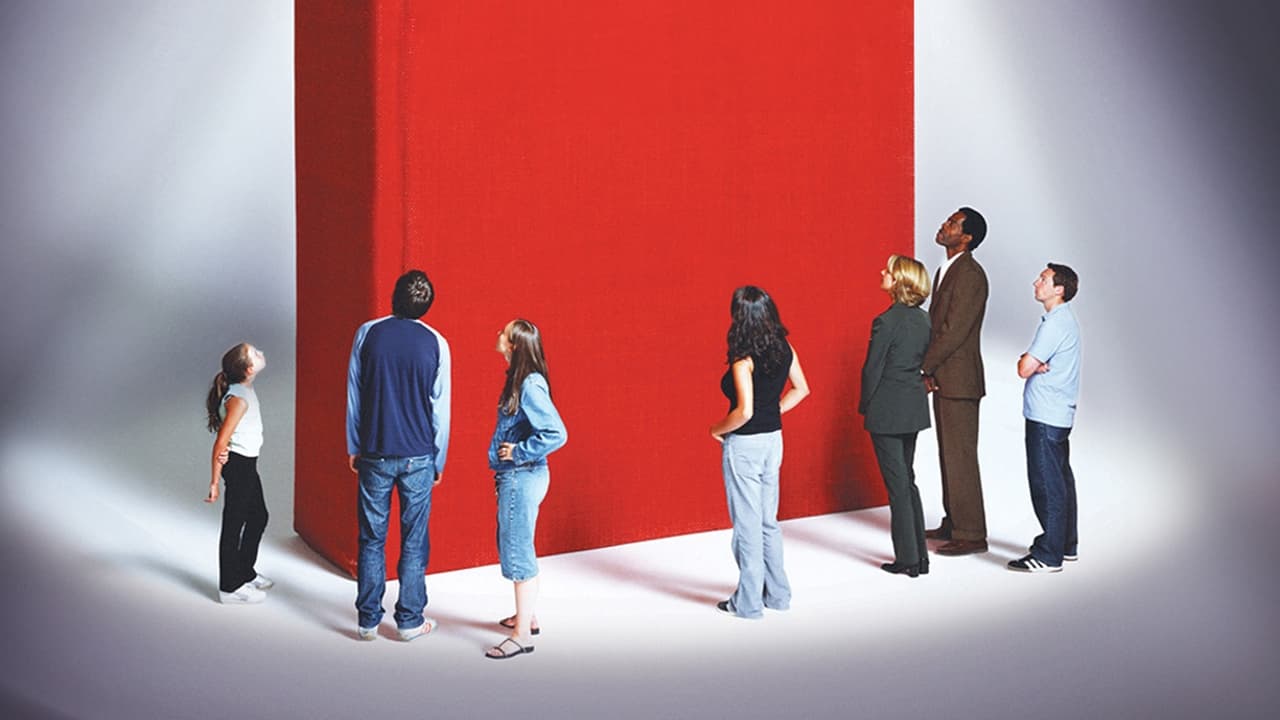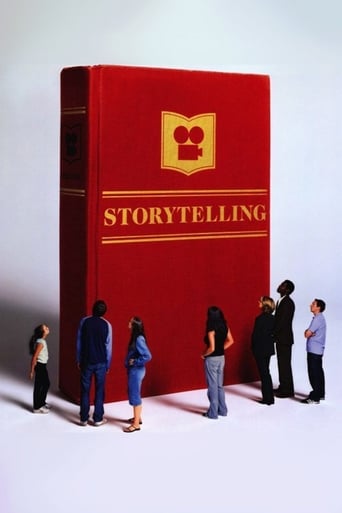

The storyline feels a little thin and moth-eaten in parts but this sequel is plenty of fun.
... View MoreThis is one of the best movies I’ve seen in a very long time. You have to go and see this on the big screen.
... View MoreLet me be very fair here, this is not the best movie in my opinion. But, this movie is fun, it has purpose and is very enjoyable to watch.
... View MoreStrong acting helps the film overcome an uncertain premise and create characters that hold our attention absolutely.
... View MoreI bought this film completely by accident thinking it was an educational piece on how to tell stories. Turns out it was a film called "storytelling." As it turns out, it was an educational piece on how to tell stories.The movie is divided into two completely different and (more or less) unrelated stories. This is the only thing that kept me from giving it 10 stars, and in most cases, this faux pas (in my humble opinion) kills a film. But Todd Solondz pulls it off! This film uses characterful exaggerations to make its point throughout. The characters' emotional development in both stories is meaningful and their relationships are complex. This is particularly true of the second story, which takes its time and is at once candid and ridiculous. If you are on the fence about this movie, I think the one thing I can say that might change your mind about checking it out would have to be that it faces the truth and faces American issues as they are.Oh, and John Goodman is the man.
... View MoreSTORYTELLING is by the director of WELCOME TO THE DOLLHOUSE and HAPPINESS and, surprisingly, is his most disturbing film. It is a film that really tries to undermine all the ugliness of the human race with incredibly heartless cruelty. WELCOME TO THE DOLLHOUSE was the film in which a little girl suffers ridicule at the hands of her classmates and family in hostile, over-the-top ways. HAPPINESS was the film in which a man rapes women over the phone while another abuses his son's friends. Both of those films were directed and written in smart, clever, ironic, and challenging ways that made sense and were better films. STORYTELLING, however, seems to try to be as impossible to watch as possible. Want proof? The opening scene involves a boy with cerebral palsy reading a story he wrote to his creative writing class before being ridiculed by his teacher and classmates about what a horrible piece of writing it is. The film, from a distance, is about two stories called FICTION and NON-FICTION. FICTION is about a girl in a creative writing class who is assaulted by her teacher. NON-FICTION is about a dysfunctional family being filmed by a documentary filmmaker. At a much closer look however, the film is just about awkward moments that everybody has only in this film they go horribly bad in every possible way. It's incredibly irritating and sickening to watch. The characters are mostly sketchy and ugly, with the main exception being the character of Scooby in the second story. His character doesn't pretend to be happy and perfect. He isn't a jerk to everybody and doesn't constantly whine. He lies a lot, mainly to himself, but doesn't harm anybody. The film covers all sorts of issues including the mentally disabled, rape, ridicule, race, homosexuality, the holocaust, and immigration. I didn't like any of the characters, nor was I supposed to. Instead I felt sorry for everybody and kind of just wanted to to all die. However, it isn't that easy in this film. Everybody is just so insanely miserable that it eventually works it's way into your psyche. I find this film to be a much more challenging film than Todd Solondz's previous outings. It's probably his least accessible and his worst. I find the film to be an incredibly daring work that certainly is worth checking out. However, the film's efforts to shock and disturb manage to overwhelm the positive aspects of it. I love the film, but I don't feel at all comfortable recommending it.Pros: -Generally a very solid film in acting, directing, set design, etc... It's all very top-notch Cons: -the film is filled with outright heartless cruelty.
... View MoreIt's not so much that this movie chose to depict a rather nefarious view of humanity; it's that this movie eliminated the possibility of anything but in the world of the characters. If someone made a movie, in this day and age, in which all the characters were happy, secure, whole and loved, a lot of people would be bored. And say that it's not very realistic. Well I was bored. A deep and subtle boredom, that (upon waking) causes one to question whether they're bored; cause that would mean feeling something...when it kind of just feels like nothing.This movie was boring. And it wasn't very realistic.
... View MoreIt's probably fun to make a movie about yourself or one that focuses closely on you and that is what director Solondz has done with STORYTELLING. Not only is the film divided into two nearly unintelligible segments, it is further broken down during the final section by portraying a down-on-his luck director (Paul Giamatti, THE ILLUSIONIST) who is obviously a doppelganger of Solondz himself.Overflowing with apathy, Storytelling has two distinct parts: "fiction" and "nonfiction." In fiction, which launches the film, we're introduced to Vi (Selma Blair, HELLBOY), a young New Jersey college student involved in a writing/literature class that concentrates on critique. Her boyfriend Marcus (Leo Fitzpatrick, THE WIRE TV series) has cerebral palsy and it appears the only reason she's with him is because of her apathy toward college life and those that haunt its halls. The teacher of the class is a forbidding black man named Mr. Scott (Robert Wisdom, also from THE WIRE), a Pulitzer Prize winner who's flat affect and bored demeanor heaves a heavy shadow over the class. But apathy attracts apathy in Solondz story, so Vi and Mr. Scott have a sexual encounter, if for no other reason than to slip out of their routines and into one another. There's actually some interesting dark sexual comedy here, but it quickly dissolves.Perhaps "fiction" was part nonfiction, too, as one could easily see Solondz sitting in a class, reading stories that get sledgehammer critiques.The second and final portion of Storytelling is "nonfiction." Here we find Toby Oxman (Giamatti), a man who can't seem to finish anything. But when he discovers a young kid named Scooby (Mark Webber, THE MEMORY THIEF) who mirrors Toby's own apathy toward life, the wannabe film maker believes he's found a new calling: to make a documentary about society. John Goodman (O BROTHER, WHERE ART THOU?) stars as Scooby's father, a big man that pushes his kids and family too hard to become his ideal nuclear family. His wife Fern (July Hagerty, AIRPLANE) is just as disinterested in life as the rest of the cast, but hides it behind a facade of smiles. The only empathetic character in the Webber household is the maid Consuelo (Lupe Ontiveros, TORTILLA HEAVEN) who gets fired because she shows some interest in life. Toby Oxman films all of the Webber household people but keeps his focus on Scooby, whom he sees strictly as a character subject.That the film ends abruptly with the death of Scooby's family, and we still see no emotional response from him, only adds to the viewer's anger that there's no one in the film to care about. No protagonist that we can get behind. No angst from any of the characters. They are blobs of human flesh pooling around each other in uninteresting ways.Directing a movie about apathy has been done before; American BEAUTY is probably the most notable of these. But the characters were multifaceted and you cared about them. Here in Storytelling, the premise seems to be filming a flick about apathy just for the sake of showing apathy.
... View More